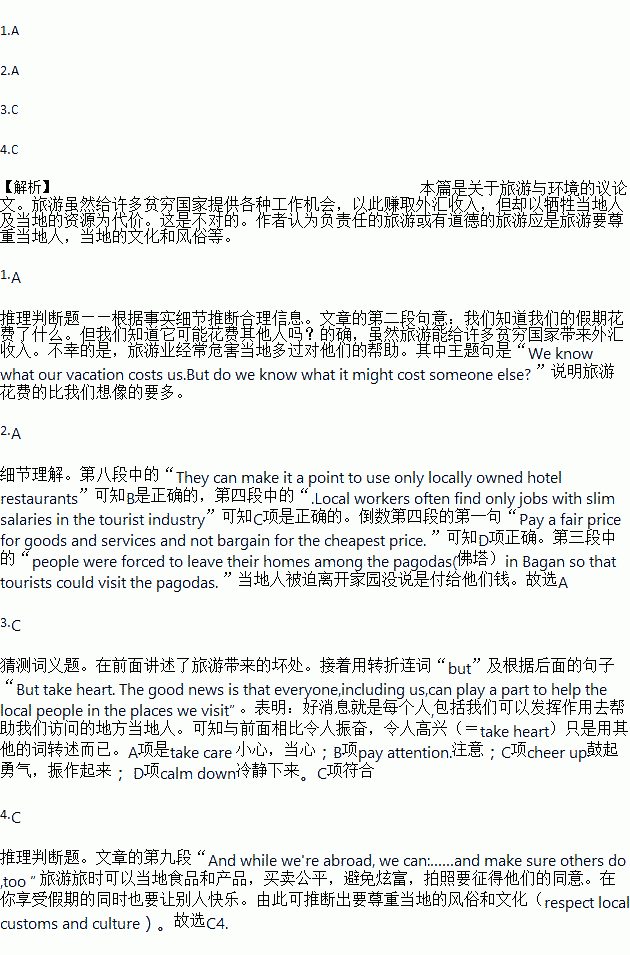题目内容
Whats your dream vacation?Watching wildlife in Kenya?Boating down the Amazon?Sunbathing in Malaysia? New chances are opening up all the time to explore the world.So we visit travel agents,compare packages and prices, and pay our money.
We know what our vacation costs us.But do we know what it might cost someone else?It's true that many poorer countries now depend on tourism for foreign income.Unfortunately,though.tourism often harms the local people more than it helps them
It might cost their homes and lands.In Myanmar.5.200 people were forced to leave their homes among the pagodas(佛塔)in Bagan so that tourists could visit the pagodas.
Tourism might also cost the local people their livelihood(生计)and dignity(尊严).Local workers often find only jobs with slim salaries in the tourist industry.And most of the profits(利润)do not help the local economy. Instead,profits return to the tour operators in wealthier countries,When the Maasai people in Tanzania were driven(驱赶)from their lands,some moved to city slums.Others now make a little money selling souvenirs or posing(摆姿势)for photos.
Problems like these were observed more than 20 years ago.But now some non-government organizations,tour operators and local governments are working together to begin correcting them.Tourists,too,are putting on the pressure.
The result is responsible tourism,or ethical tourism.Ethical tourism has people at its heart.New international agreements and codes of conduct(行为准则)can help protect the people's lands homes,economies and cultures.The beginnings are small,though,and the problems are complex.
But take heart.The good news is that everyone,including us,can play a part to help the local people in the places we visit Tour operators and companies can help by making sure that local people work in good conditions and earn reasonable wages.
They can make it a point to use only locally owned hotel restaurants and guide services.They can share profits fairly to help the local economy And they can involve the local people in planning and managing tourism.
What can tourists do?First,we can ask tour companies to provide information about the conditions of local citizens.We can then make our choices and tell them why.And while we're abroad,we can:
Buy local foods and products,not imported ones.
Pay a fair price for goods and services and not bargain for the cheapest price.
Avoid flaunting wealth.
Ask before talking photographs of people.They are not just part of the landscape!
Let's enjoy our vacation and make sure others do,too.
1.What is probably the best title for the article?
A. Vacations Cost More Than You Think
B. Tourism Causes Bad Effects
C. Vacations Bring a Lot of Fun
D. Tourism Calls for Good Behavior
2.Which of the following is not mentioned?
A. Local people were well paid to leave their lands
B. Tourists may stay in hotels opened by local people.
C. Local people are mainly provided with low-paying work
D. Tourists could bargain with local people for a reasonable price
3.The underlined phrase "take heart" means " ".
A. take care B. pay attention.
C. cheer up D. calm down
4.According to the passage,the writer thinks .
A. tourism is not a promising(有前途的)industry
B. dream vacations should be spent abroad
C. tourists should respect local customs and culture
D. the problems caused by tourism are easy to settle
 阅读快车系列答案
阅读快车系列答案

 tain ship and landed in London, where he found himself without money, friends 6. a job. But he had to earn his living, which could account for (解释...的原因) his 7. (appear). One day when he was wandering on the pavement and didn’t know 8. to do, he heard somebody 9. (call) him. Then he was led to two brothers 10. made a bet and gave him an envelope with a large sum of money in it .
tain ship and landed in London, where he found himself without money, friends 6. a job. But he had to earn his living, which could account for (解释...的原因) his 7. (appear). One day when he was wandering on the pavement and didn’t know 8. to do, he heard somebody 9. (call) him. Then he was led to two brothers 10. made a bet and gave him an envelope with a large sum of money in it .